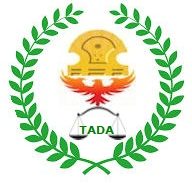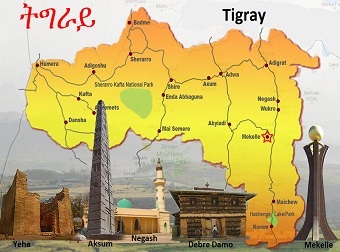Ref: TEAO- 74/2022
Date: 17 February 2022
On February 16, 2022, Amnesty International issued a report entitled, “Tigrayan forces murder, rape and pillage in attacks on civilians in Amhara towns.” Specifically, the report outlines alleged extrajudicial killings and acts of sexual violence in the towns of Kobo and Chenna, in North Wollo and Northern Gondar respectively from late August to early September of last year. In light of the numerous procedural and substantive problems that bedevil the latest report, it would be tempting to dismiss it right off the bat. However, out of respect for the alleged victims, the Government of Tigray feels compelled to address these allegations head on.
The Government of Tigray reiterates that Tigray’s Army does not condone the deliberate targeting of civilians. Tigrayan forces were not out there to inflict the same horrific pain on people in neighbouring regions as the Ethiopian, Eritrean and Amhara forces did on our people. Sexual violence is a heinous crime that leaves enduring physical and psychological scars on the victims. As amply documented by various media outlets and institutions, thousands of Tigrayan women have been the victims of this vicious crime. As a result, the commission of such crime against civilians could not be farther from the organizational mission of Tigray’s popular forces.
To the degree that non-combatants have been victimized by any member of Tigray’s Army, our heart goes out to the victims of such crimes. If our investigation finds that Tigrayan fighters have in fact deliberately targeted non-combatants, the Government of Tigray will bring the perpetrators to justice. Even so, ultimate responsibility for whatever harm might have been done to civilians must be laid at the feet of the criminal Abiy regime and the expansionist Amhara elite. This destructive duo has, through incessant propaganda and reckless disregard for the social fabric of the country, transformed a political conflict into a bloody internecine war by mobilizing tens of thousands of poorly-trained, untrained, ill- equipped, and often unarmed civilians.
Nonetheless, Amnesty, in rushing to accuse Tigrayan forces of war crimes for allegedly killing unarmed civilians, has stripped the report of the necessary contextual background, thereby painting, at best, a partial and misleading picture of what might have transpired.
Starting in early August, the Abiy regime and Amhara authorities had called on the rest of Ethiopians to confront Tigrayan forces with whatever weapons at their disposal. On August 10, for instance, as the Associated Press (AP) reported, the Abiy regime called on “all capable citizens to fight in the Tigray war.” As the AP rightly noted then that “the call to arms is an ominous sign that all of Ethiopia’s 110 million people are being drawn into a conflict” that had already claimed the lives of tens of thousands. During his televised appearance and in a written statement, the Prime Minister, Abiy Ahmed, called on citizens to be “the eyes and ears of the country in order to track down and expose spies and agents” of the Tigrayan Army. This dangerous call to arms was not made off the cuff, but as part of a strategy to whip up civilians into frenzy with a view to stopping our forces’ advances by deploying human waves. By priming unarmed civilians to engage our forces, the regime put them at risk by blurring the line between combatants and non-combatants, thereby rendering impracticable the principle of distinction under the laws of war.
For its part, the Amhara regional government had issued an official call for unarmed civilians to engage our forces. To incentivize them to obey this immoral instruction, the regional authorities added that civilians would legally own whatever weapons they managed to wrest from our forces. This irresponsible and dangerous policy effectively put civilians at risk by turning them into combatants without the advantages of trained and armed fighters.
It is in the context of such toxic discourse coming from the upper echelons of the federal and Amhara regional governments that our forces were conducting their defensive operations.
It is our belief that only an independent investigation by an impartial international body can get to the bottom of all of atrocities. But we will highlight some problems that undermine Amnesty’s core claims about our forces having committed war crimes. For instance, Amnesty’s report claims that “Tigrayan fighters deliberately killed unarmed civilians, seemingly in revenge for losses among their ranks at the hands of Amhara militias and armed farmers.” Human Rights Watch (HRW) had issued a similar report on both towns, with some details not found in Amnesty’s report.
In Kobo, Tigrayan forces were searching for weapons and chasing armed actors operating in the area. According to HRW, “In at least two villages, Gedemeyu and Zobel, farmers responded by attacking the Tigrayan forces.” This detail is consistent with the regime’s calls for civilians to confront our forces. Under the laws of war, our forces had a legitimate right of self-defence.
More significantly, during the period under consideration, there was an armed extremist group that confronted Tigrayan forces operating in the area at the direct behest of the Abiy government. While this extremist group is not a formal element of the Ethiopian state, it is actively sponsored by the Ethiopian security services. The Abiy regime and Amhara authorities are trying to gloss over their complicity in these crimes, given their direct role in sustaining this marauding gang of criminals, by pre-emptively and baselessly blaming our forces for the atrocities committed by the group.
In the fighting in Dabat, where Chenna is located, thousands of unarmed civilians, including priests and other religious figures carrying “Tabot” or a replica of the Ark of the Covenant came out to engage our forces. Indeed, the HRW report noted that “Some Chenna villagers fought alongside government soldiers, which under the laws of war would be directly participating in the hostilities.” Again, both Amnesty and HRW, by downplaying the significance of the regime’s de facto militarization of civilians, undermine the credibility of their own findings.
One of the Abiy regime’s strategies for whitewashing its genocidal campaign in Tigray is to saturate domestic and international media outlets with unsubstantiated and false allegations of war crimes against our forces. The intent behind this cacophonous rush to malign our forces is to create a counter-narrative, whereby the systematic campaign they undertook to exterminate the people of Tigray, grounded in facts and catalogued for posterity, is just another competing allegation undeserving of special attention. That they have been accusing our forces of committing the same crimes they themselves have been credibly accused of committing is evidence of this deceptive intent. The international community should not fall for this cheap stunt.
The Ethiopian and Eritrean militaries and Amhara regional forces have violated practically every tenet of International Human Rights Law (IHRL) and International Humanitarian Law (IHL) in Tigray. No village in Tigray has been spared from the long reach of these genocidal forces. Their feeble attempt to establish moral equivalence between their forces and that of Tigray’s Army is designed to conceal the extent of their criminal record in Tigray and force the international community to adopt the position that ‘all sides have committed atrocities.’ But there can never be equivalence between isolated incidents of misconduct by Tigrayan forces and the systematic campaign to exterminate the people of Tigray.
The Government of Tigray believes that only an independent investigation by an impartial international body can get to the bottom of all atrocities committed since the start of the genocidal war on Tigray. However, the Abiy regime has been consistent in its refusal to entertain the idea of an independent investigation, rightly concerned that it would shed light on the degree of unimaginable atrocities they committed and continue to commit against the people of Tigray.
For instance, in strenuously objecting to the recent resolution by the UN Human Rights Council (UNHRC) establishing an independent panel of experts to investigate human rights violations throughout the conflict, the Abiy regime invoked the fact that there had been an independent investigation, conducted jointly by the Ethiopian Human Rights Commission (EHRC) and the Office of the High Commissioner for Human Rights (OHCHR). The involvement of the EHRC had, of course, enabled the regime to steer the investigation in its preferred direction and escape accountability, fatally undermining the credibility of the joint report. Even if one accepts the credibility of the joint report, the fact remains that the temporal and spatial scope of the investigation was so severely circumscribed that it simply failed to address rights violations across many crime spots in Tigray.
What is more, the criminal Abiy regime objected not only to the UNHRC resolution itself but also to the very idea that a concerned community of nations can scrutinize a state’s actions so long as the defence of those actions is cloaked in the language of sovereignty.
By contrast, the Government of Tigray has always called for an independent investigation into the devastating atrocities committed in Tigray. The Government of Tigray will, therefore, fully cooperate with the International Commission of Human Rights Experts on Ethiopia as it undertakes its independent investigation into any and all atrocities committed during the war on Tigray. We call on the Abiy regime to reconsider its unjustifiable intransigence and accept the legitimacy of the Commission and extend a cooperative hand. Failing acceptance of the Commission’s legitimacy and willingness to cooperate with it, the Abiy regime’s incessant noise about rights violations by our forces will be nothing more than crocodile tears. Moreover, it should desist from exploiting people’s suffering for cheap propaganda.
That being said, we have respect for the works of human rights advocates, such as Amnesty. All the same, Amnesty and other international human rights organizations should not compromise the credibility of their important work by unwitting or wittingly becoming accomplices to the Abiy regime’s incessant propaganda and brazen attempt to whitewash its well-documented genocidal campaign in Tigray. In particular, human rights advocates should not allow their work to be used to establish false equivalence between isolated incidents of misconduct and a systematic campaign of brutality inflicted on the people of Tigray.
Email: info@tigrayeao.org Page 4 of 4 Mekelle, Tigray

